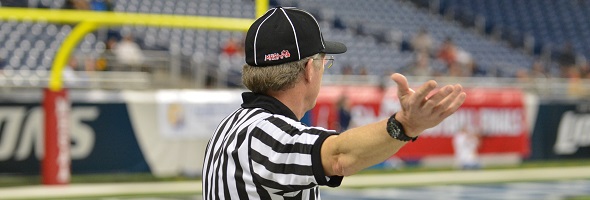
Be the Referee: Football Overtime
October 1, 2014
This week, MHSAA assistant director Mark Uyl explains how football overtime is played at the high school level.
"Be the Referee" is designed to help educate people on the rules of different sports, to help them better understand the art of officiating and to recruit officials. The segment can be heard on Mondays, Wednesdays and Fridays during the school year on The Drive With Jack Ebling on WVFN-AM, East Lansing.
Below is this week's segment - Overtime - Listen
There is nothing better for a football fan than a close game, and the ultimate is when that close game ends up going into overtime.
The high school overtime rules are quite similar to those used at the college level. In other words, both teams are going to be guaranteed one possession of the ball starting out first down and goal to go from the 10-yard line. A couple of key differences are if the defense gets possession of the ball on an interception or on a fumble, the ball is dead and the teams switch offense and defense, In other words, that ball can’t be returned for a defensive score to end the game.
There is also no requirement that the offense at any point after a touchdown be required to go for two (points). If the game would go seven or eight overtimes, teams can continue to simply kick the one point extra point.
Past editions
Aug. 25 - Targeting - Listen
Sept. 4 - Concussions - Listen
Sept. 11 - Pass Interference - Listen
Sept. 18 - Tackle Box - Listen
Sept. 25 - Field Goals - Listen

Be the Referee: Ski Finish
By
Sam Davis
MHSAA Director of Officials
February 21, 2023
Be The Referee is a series of short messages designed to help educate people on the rules of different sports, to help them better understand the art of officiating, and to recruit officials.
Below is this week's segment – Ski Finish - Listen
The sun is out, the snow is in great condition, I’m zooming down the hill … making all my gates … I’m having a great run at the Ski Finals. But as I near the finish line, I lose a ski. Maybe I lose both skis. But my momentum is enough, or I’m good enough on one ski to cross the finish line. Is that a legal finish?
Ski rules state that the athlete’s feet must cross the finish line. That can be done on both skis, one ski – or no skis.
With electronic timing, the clock stops when any part of the skier crosses the line. With hand timing, the clock should be stopped when the skiers feet cross the line.
If there is a question, the referee and timekeeper are responsible for determining a legal finish.
Previous Editions:
Feb. 14: Swimming Touchpads - Listen
Feb. 7: In or Out-of-Bounds in Wrestling - Listen
Jan. 31: Over the Back - Listen
Jan. 24: Competitive Cheer Judges - Listen
Jan. 17: More Lines - Listen
Jan. 10: On the Line - Listen
Jan. 3: Basketball Measurements - Listen
Dec. 13: Pregame Dunks - Listen
Dec. 6: Gymnastics Judges - Listen
Nov. 22: Football Finals Replay - Listen
Nov. 15: Back Row Illegal Blocker - Listen
Nov. 8: Swim Turn Judges - Listen
Nov. 1: Soccer Referee Jersey Colors - Listen
Oct. 25: Cross Country Tie-Breaker - Listen
Oct. 18: Soccer Shootouts - Listen
Oct. 11: Safety in End Zone - Listen
Oct. 4: Football Overtime Penalty - Listen
Sept. 27: Kickoff Goal - Listen
Sept. 20: Soccer Timing - Listen
Sept. 13: Volleyball Replays - Listen
Sept. 6: Switching Sides - Listen
Aug. 30: Play Clock - Listen
Aug. 23: Intentional Grounding Change - Listen

